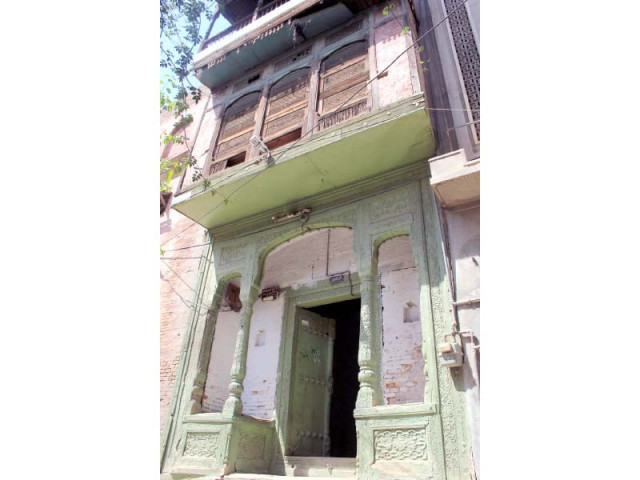Past glory: Crumbling heritage in Walled City
Time has left its mark on Yahya Khan family house, residual grandeur of rich architecture is still awe-inspiring.

A plaque in Persian on ex-president Yahya Khan’s house says it was built in 1890, on the left is the view of the house. PHOTO: MUHAMMAD IQBAL/Express
“Let the quill write about event and the year, blessed be this abode for you,” reads Persian text on a commemorative plaque put up on the main gate of a modest house in the congested Ganj area of Walled City. Built in 1890, this house once belonged to the family of Yahya Khan, the third president of Pakistan.
Brick by brick, buildings in part of Peshawar have been demolished. A few of those monumental structures that were once the pride of this city, still stand.
Time has left its mark on the Yahya family house, but the residual grandeur of the rich architecture is still awe-inspiring. The house was owned by Yahya’s grandfather Ghulam Haider Khan. Later Rahat Ali Khan, an uncle of Yahya, inherited it from his father. Saadat Ali Khan, Yahya Khan’s father, got another house in the same lane that has already been razed to the ground.
The walls of the 27-marla house are about 30 feet high, constructed with Waziri bricks, wood ashes and lime stone. The main gate is intricately crafted in wood and bears beautiful floral carvings, geometric patterns and Persian calligraphy.
Currently, the house is owned by Qadir Muhammad Khan who lives there with a big family. Qadir’s father purchased it from Rahat Ali Khan. “We purchased it for Rs25,000 in 1970,” Qadir told The Express Tribune. “Neither in 1970 nor now has anyone realised its historical value, though I know that after standing strong for 75 years, a building becomes a historical asset.”
“My father purchased the house after selling 300 marlas of land in Swabi [district],” said Qadir. “The original internal structure of the house has already been demolished. Only the front portion and the beautifully designed wooden roof remains,” he added.
Relic hunters who know the worth of every bit of this house have set their eyes on the decorated doors in particular. The owner has been offered huge amounts of money for the doors, so that they can be smuggled out of the country.
“A few years back, they offered us a hefty sum for just the main door, but we refused the offer, and told them that we will pay double the price if they bring us such doors,” said the owner. He added that he would not sell the main door for less than Rs5 million.
The owner said he realised the value of the artwork in the house, but eventually it would have to be demolished in order to construct a new building to accommodate the family. “A lot of beautiful carved woodwork pieces of the house were sold to antique hunters at a very low price because earlier we did not know their value,” said Qadir.
The mohalla that once was
The street, Muhallah Shaikh Ul Islam, Ganj, where the house is situated, was once the main administrative area of the Walled City.
Sardar Mehmood Ahmad Khan, a distant relative of Yahya Khan who still lives here, gives a verbal history of the area. “All important decisions used to be taken here, and problems of the people were addressed by the Sardars appointed by the Mughal rulers. Residents of this street originally belonged to Iran. They came to Peshawar, and were made to settle here to administer the city.”
The Muhallah once had a huge stable, guest houses and designated areas where complaints of people were heard. “All this has been demolished. The stable has been changed into a Hujra (guest house),” added Mehmood.
A senior official of the archaeology department was of the opinion that the officials of the department should declare the area an archaeological site under the Antiquities Act of 1975. “We cannot protect historical sites, mainly due to lack of resources,” he said.
Published in The Express Tribune, May 19th, 2014.












COMMENTS
Comments are moderated and generally will be posted if they are on-topic and not abusive.
For more information, please see our Comments FAQ